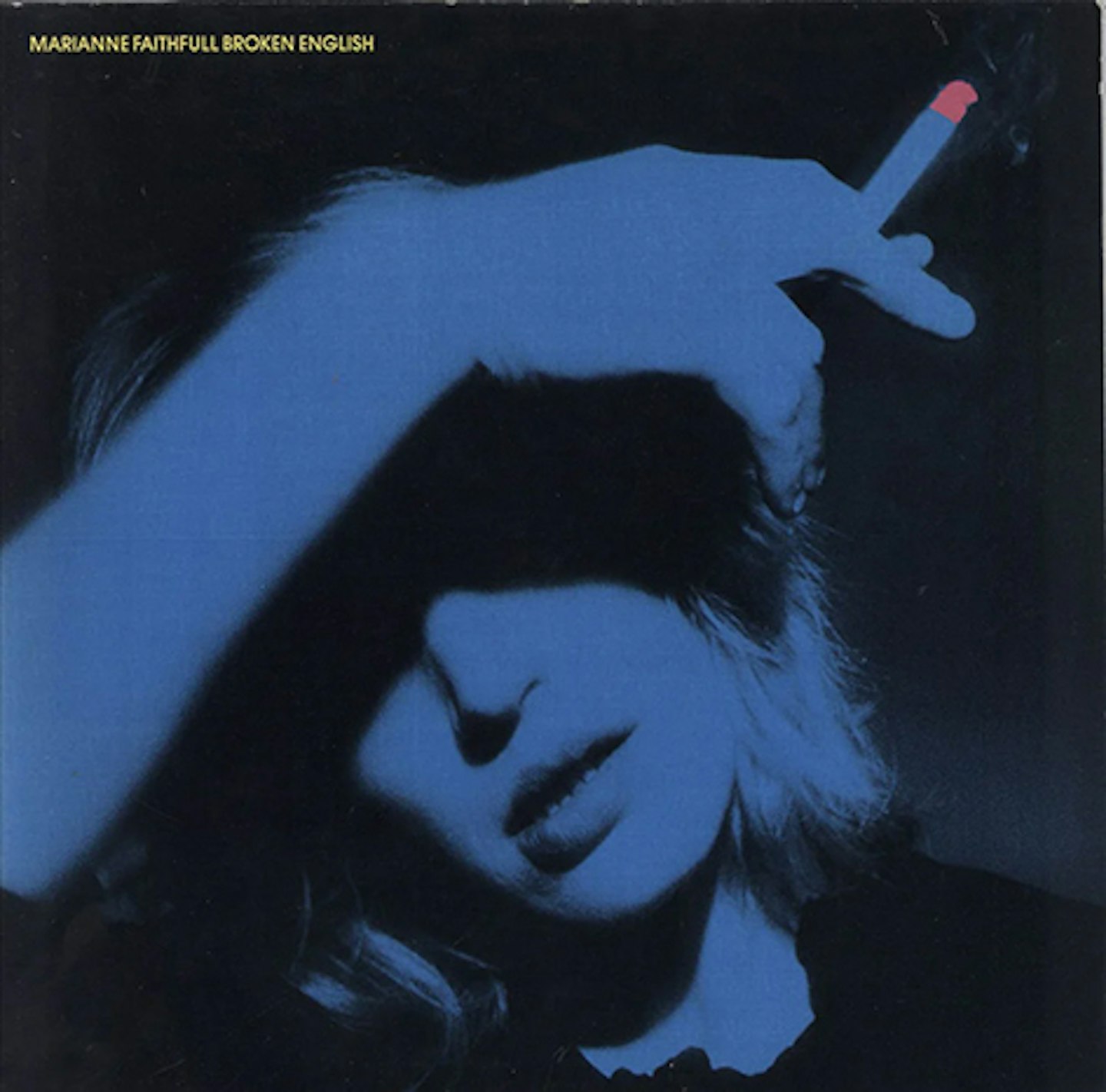AS THE SEVENTIES DREW TO A CLOSE, THE ROLLING STONES WERE IN NEW YORK mixing their next big-seller Emotional Rescue, with some partying with Stevie Wonder and, in Ron Wood’s case, sharing a stage with Bob Marley in California thrown in. Few were thinking of their old, infamous friend from the sixties Marianne Faithfull.
Her first hits – how fresh As Tears Go By and Come And Stay With Me sounded – were more than fourteen years in the past. In the seventies her interest in music had largely given way to stage acting and roles in low-key films including Madhouse Mansion and Assault On Agathon. Enduring heroin addiction, she’d lived in a freezing squat in Chelsea, played in fans’ houses in exchange for food and even engineered a tour of Holland as improve her living standards. But this November, she would surprise them all with her comeback album Broken English.
In her 1994 memoir Faithfull: An Autobiography, she reflected on how her image as a “tarnished Pop Star Angel”, owed to her years with the Stones, was like an albatross around her neck. “I had reluctantly come to the conclusion,” she wrote, “that if I was ever to obliterate my past I’d have to create my own Frankenstein, and then become that creature as well.”
Her route back had begun, oddly, with a surprise Irish number one hit with March ‘76s country single Dreamin’ My Dreams. A touring band which included Faithfull’s soon-to-be-husband Ben Brierley on bass and guitarist Barry Reynolds turned into something different when they began co-writing with the singer.
As well as Faithfull’s now-weathered smoker’s rasp, the punk upsurge also informed her new direction. Producer Mark Miller Mundy was struck when he saw a Faithfull band gig at the Music Machine in 1978 (the same year she was set to play Sid Vicious’ mum Anne in the unrealised Russ Meyer-directed Sex Pistols movie Who Killed Bambi?). One of the songs the tightly drilled group played was a searing reggae interpretation of Heathcote Williams’ 1968 poem of sexual betrayal Why D’Ya Do It. They recorded the track and Cold War disco number Broken English – inspired by West German terrorists the Baader-Meinhof Gang – in the subterranean Matrix Studios in Bloomsbury. Mundy took the tapes to Island Records’ Chris Blackwell, who duly signed her up for an album.
The summer ’79 sessions were not exactly harmonious: Marianne remembered Mundy as “useless as a producer as well as being a flaming asshole,” also noting, “I was working on Broken English and Ben was off in LA having affairs. I was wild with jealous rage.”
An intensity was being captured, however, and it was deepened when Mundy’s previous client Steve Winwood came in to add New Wave-friendly synthesizer parts. While the singer has spoken up for the flintier rock mix (which was released on 2013’s Deluxe Edition), the electronic textures and frigid washes added striking gothic dimensions to songs including junkie boogie What’s The Hurry and the self-lacerating Guilt. Her brooding version of Working Class Hero, she said, was sung in tribute to Mick and Keith, Bowie and Iggy and Lennon himself – all self-realised creatures, as she was. The composer would be dead in a matter of weeks, but Yoko Ono confirmed he’d heard it and approved.

The expletive-heavy Why D’Ya Do It closed the album, prompting boycotts by UK pressing plants and EMI’s distribution arm (the Australian edition even replaced the song with a blank track entitled, oddly, ** ** **’* ***). Having commissioned Derek Jarman to make a three-song, twelve-minute film involving punk-paganism, Soho sleaze and Nazi imagery, Island pushed on, and were vindicated. The Sun and The Guardian were both fulsome in their praise of the record, while John Peel played its songs among Joy Division and Killing Joke. On November 24 Marianne’s bruised, vaporous version of Dr Hook’s The Ballad Of Lucy Jordan entered the UK top fifty, and soon went top five across Europe. The following week Broken English made it to 57 on the British album charts, reaching a respectable number 82 in the US and winning a Grammy nomination.
The singer still wasn’t above a little self-sabotage, though. On a high-profile appearance on Saturday Night Live! in February 1980, her voice was compromised when she unwittingly ingested the dental anaesthetic Procaine. Back home in her squat, she recalled spending her first big cheque from the record on clothes and more drugs. But she had proved something vital, and resurgent in the decades that followed, she’d prove a lot more, working with PJ Harvey, Nick Cave, Blur's Damon Albarn and many others.
“The thing about Broken English,” she told MOJO’s Sylvie Simmons in 2005, “it’s this sense, this energy, that ‘Fucking hell, before I die I'm going to show you bastards who I am.’ … I can’t repeat (it). Because I actually realised, obviously I’m going to die, but not yet...”
Main photo: Marianne Faithfull, New York, February 11, 1980. (Credit: Ebet Roberts/Redferns)
